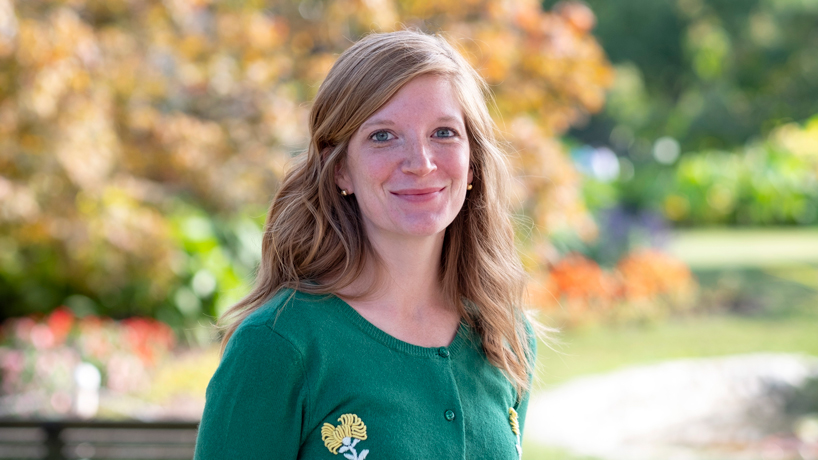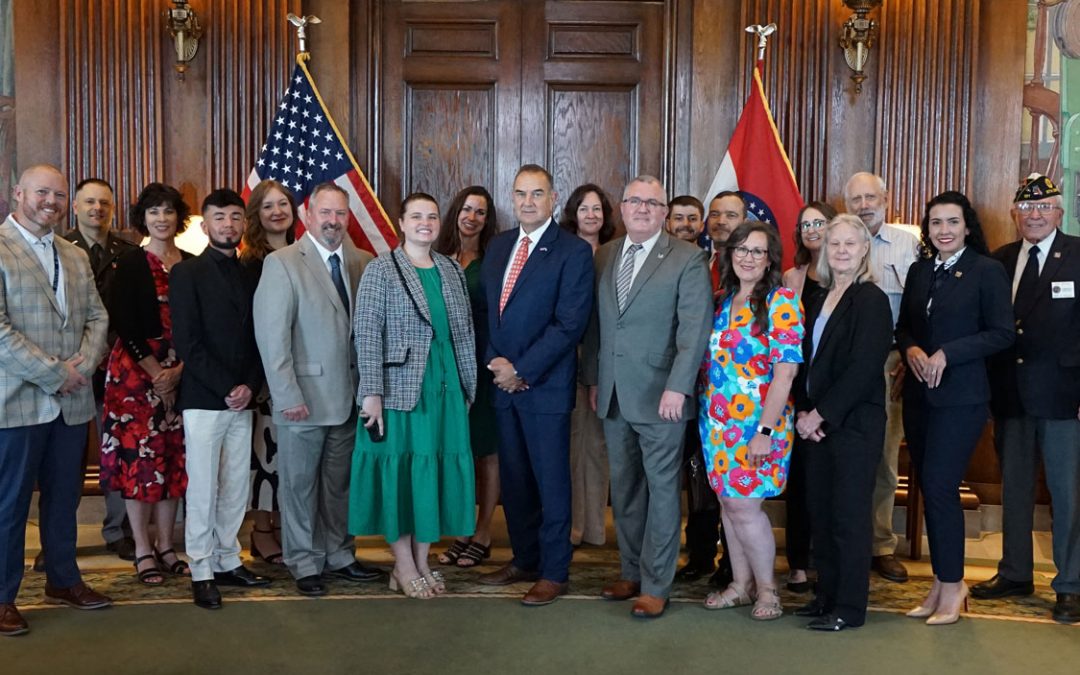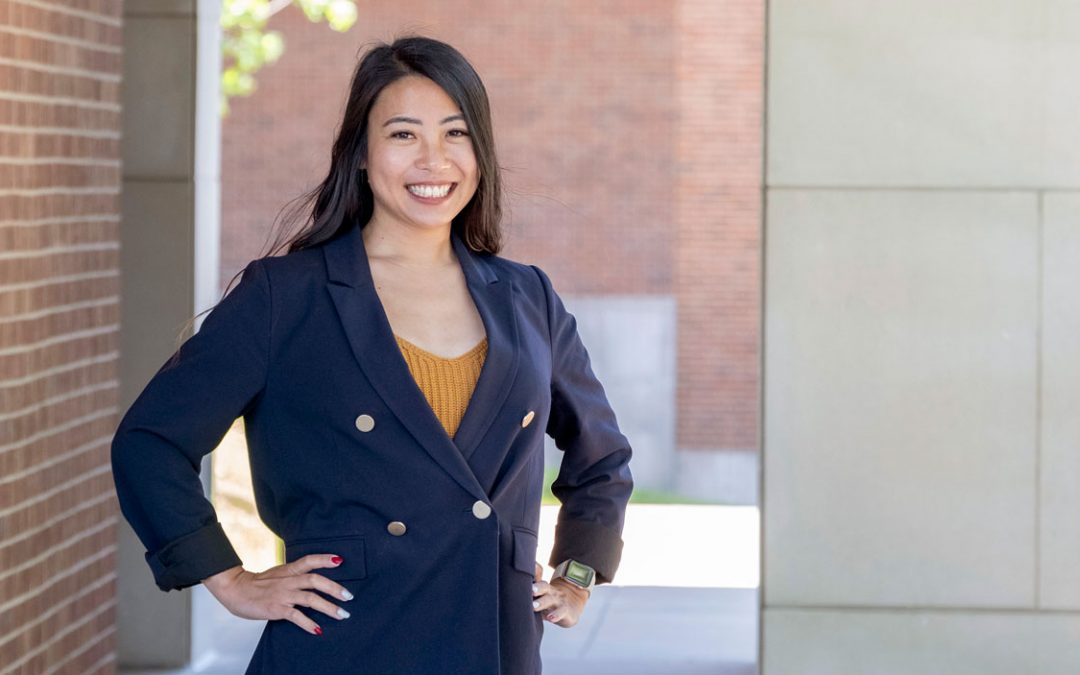
MSW graduate Anna Hall works at the International Institute of St. Louis, helping immigrants and refugees adjust to life in a new country. She teaches a class called, “Career Advancement for International Professionals” and also collects data for the the Refugee Family Strengthening Program. (Photo by August Jennewein)
As an undergraduate student at Greenville University, Anna Hall entered a study abroad program that took her through parts of Latin America to improve her Spanish – not knowing it would lead to her future career.
The experience had a profound effect on Hall, leading to a career in social work with an MSW from the University of Missouri–St. Louis. Hall now works at the International Institute of St. Louis, helping immigrants and refugees adjust to life in a new country.
Her work today has its roots in that trip.
“I did a study abroad program through an organization called Best Semester, and it was incredibly influential,” Hall said. “We were focused in Costa Rica and Nicaragua, then and spent about 10 days in Cuba. That opened my eyes and transformed me in such a way that I wanted to continue pursuing international studies and cross-cultural work.”
After Hall graduated with her bachelor’s degree, she made good on that goal and became a case specialist for refugee resettlement at the International Institute of St. Louis.
“I was in social services in a way that I could see myself doing in a more long-term, professionally grounded way,” she said. “That work then led my husband and I overseas, working for an educational program called GO ED. That was in East Africa, and we coordinated a semester study abroad for students that were at the undergraduate level and even worked with refugees there in Rwanda.”
Hall’s time in Rwanda compelled her to pursue a master’s degree when she returned to St. Louis.
“St. Louis, of course, is a great place to get a master’s in social work, or a bachelor’s in social work for that matter,” she said. “It’s a great social work city.”
She investigated her options and found that UMSL’s MSW program was the best fit for her. Uma Segal, a professor of social work and an expert on global migration and immigrant and refugee integration, became a mentor to Hall during her time at the university. Segal provided encouragement and support and still checks in with Hall.
While at UMSL, Hall became deeply involved on campus, primarily through her role as a graduate research assistant. That position led her to become active with the Student Social Work Association, but she also attended events regularly and participated in conversations about current events with other social work students.
“Friends have asked me about doing a master’s program or about going to UMSL, and my encouragement is always, ‘Yes, do it and be a student,’” she said. “Participate, go to conferences on campus, go to events, go to colloquiums, go to presentations, because when else in our lives do we have the opportunity to just be a full-time student?”
Research was also important to Hall. She won second prize for her literature review on refugee resettlement and treatment for refugee mental health issues and post-traumatic stress at the 2016 UMSL Graduate Research Fair.
Since earning her MSW, Hall has continued her cross-cultural work at the International Institute of St. Louis. She teaches a class called, “Career Advancement for International Professionals” and also works on data collection.
The class is offered through the agency’s education department, and it’s geared toward individuals with higher-education degrees from their home countries who are trying to connect their expertise and experience to employment opportunities in the United States.
“This particular class focuses primarily on professional development,” Hall said. “Resume writing, cover letters, interview preparation, networking, things like that.”
To put those concepts into action, the International Institute holds mock interview nights where Hall’s students go through three rounds of interviews with volunteers. One of the primary obstacles they face is the language barrier, so they practice articulating and focusing on specific words they can use to express their value to potential employers.
Hall noted that her students are exceptional individuals and respected in their fields in their native countries. However, aside from the language barrier, they also have to adjust to new cultural norms and processes.
“It’s figuring out, how is it done here?” Hall said. “How is the job search, job process and professional communication done here? If you got off a plane and started a job search in another country, it just looks different than how we would navigate our roles here.”
Those difficulties are also amplified because many of her students don’t have professional connections or an extended support system in the United States. That’s why Hall does what she can to instill confidence in them.
“I think a big part of the class is saying, ‘You can do it,’” she said. “I really tried to make that an important part of my role as a teacher in the class. The skills you carry because of who you are and the experiences you’ve had make you the most resilient people without me even knowing you that well. So, you can do it.”
In her other role, Hall collects data for the Refugee Family Strengthening Program. The data comes from a class open to any foreign-born individuals living in the St. Louis area. The class includes a series of workshops that focus on communication, stress, finances, parenting and family relationships. Participants take a survey before starting the class and after finishing it, and Hall helps gather the resulting data.
Many of refugees Hall works with come from the Democratic Republic of Congo and were resettled in refugee camps in Rwanda before coming to the U.S. Due to her time in Rwanda, she is often able to greet Congolese families in a common regional dialect, forging an instant, if small, connection.
Hall noted those connections are all around us, growing and evolving in American culture. That’s what she loves about the city she calls home.
“The influence and impact of the foreign born in St. Louis has made St. Louis what it is,” Hall said. “We are not separate from them. Yes, our experiences might be very different. Our homes might look very different. What we eat on a regular basis or the language we use might be different. But the beauty is that we’re sharing the same space, and we’re shaped by each other. That’s something that I hope people continue to realize and appreciate about St. Louis.”














